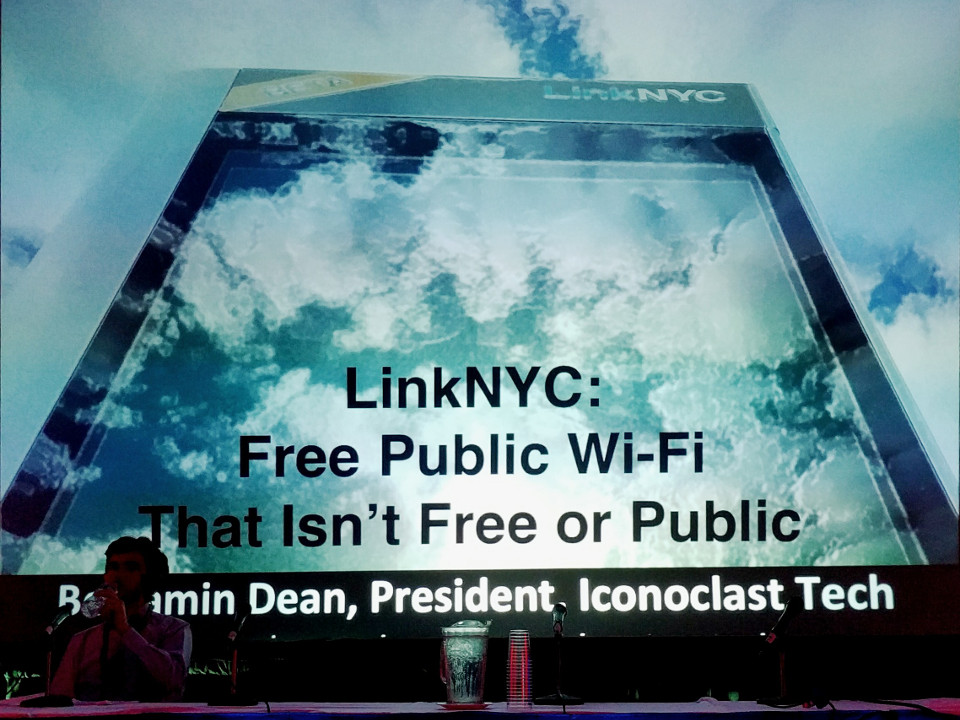Last weekend, at the Eleventh HOPE, we took a front row seat for the talk entitled LinkNYC: Free Public Wi-Fi That Isn’t Free or Public knowing it would critically challenge the recent local deployment of connectivity infrastructure, not unlike that which is core to our vision.
LinkNYC is an infrastructure project currently being rolled out across New York City’s five boroughs, promising “Free super fast Wi-Fi. And that’s just the beginning”. This is achieved via up to 10,000 links, progressively replacing pay phones. Each link includes two large screens for advertising and PSAs, a tablet for interaction, 3 cameras and 30 sensors, and, of course, Wi-Fi, with plenty of bandwidth thanks to a dedicated fiber connection.
Free, widespread Internet connectivity for the masses, how brilliant! As we’ve previously argued, connectivity is the critical underlying fabric of not only the Internet, but life itself. Imagine what the promise of ubiquitous connectivity holds! That is, until you inspect the underlying fabric of LinkNYC as the Hackers On Planet Earth (HOPE) are so adept at doing.
Benjamin Dean, President of Iconoclast Tech and Fellow for Cyber Security and Internet Governance at Columbia SIPA, did exactly that in his presentation, raising what for us are two critical concerns regarding the future of ubiquitous connectivity infrastructure.
1. The digital business model is transposed to the physical
Dean illustrated that when you add up the published revenues and expenses, the corporate partners appear to lose $50M over the course of the project. This, of course, raises suspicions of an alternative revenue stream, which was clearly alluded to in the following quote from Don Doctoroff, head of Google/Alphabet’s Sidewalk Labs, one of the partners in the project.
“By having access to the browsing activity of people using the Wi-Fi — all anonymized and aggregated — we can actually then target ads to people in proximity and then obviously over time track them through lots of different things, like beacons and location services, as well as their browsing activity. So in effect what we’re doing is replicating the digital experience in physical space.” (Original source)
While there are definitely aspects of our collective digital experience we feel would be beneficially transposed to the physical world in the age of the Internet of Things, the advertising-driven business model certainly doesn’t top our list. Especially given Dean’s calculation that the project could be entirely publicly funded at a cost of fractions of a penny per citizen per day. Is that too much to ask? And would the economic benefits generated by ubiquitous connectivity alone not indirectly subsidise taxpayer investment in the project many times over?
2. Vague policies promote privatisation, not privacy
Given his background, Dean had no difficulties raising serious concerns with the privacy policies of the project. To paraphrase these policies (with no attempt to emulate his articulate analysis thereof):
- we won’t do creepy stuff like facial recognition
- we can share the data we collect with third parties
- we won’t explicitly state anything that prevents them from doing creepy stuff
In other words, nothing appears to prevent your private information from ending up in the hands of private organisations. Perhaps not the organisations involved in the project, but at least those within their arms reach.
Contrast this to our privacy policy which we’ve done our utmost to keep short, clear and readable, and which concludes with the sentence:
Wish we had more to tell you but honestly, we really want to have as little as possible to do with your personal information aside from enabling you to share it when you want, where you want and with whom you want!
While we’re quite proud to champion the notion of users retaining the control of their data and with whom it is shared, the LinkNYC debate nonetheless reminds us of its fragility, given that nothing prevents subsequent layers of third party platforms from exercising policies analogous to the aforementioned. Perhaps a GPL-style privacy policy that influences/contaminates (depending on which side of the debate you’re on!) subsequent policies is the answer? Although for those who attended Richard Stallman’s talk at the same conference, it’s clear that such policies are controversial even within a sympathetic community!
And as for applying the digital advertising-driven business model to the physical world, we have a simple counter argument in economic terms: it’s an outdated, inefficient model. We’re in the early throes of an industrial revolution which will create overwhelming volumes of real-time contextual data, with, arguably, much more of it consensually shared, promising massive economic gains through efficiencies. However, in any revolution, the outgoing paradigm will coexist alongside the new for some time. While LinkNYC seems poised to continue to bet on the former, we’re confident that a growing number of startups, ourselves included, are betting wisely on the latter.
In conclusion, while there are clearly valid concerns around the LinkNYC project, overall the benefits of ubiquitous connectivity, free and public or not, are arguably positive. The history of the Internet suggests that the public will nonetheless overwhelmingly accept any such tradeoffs. A revolutionary change in the underlying business model is unlikely to come from public dissent, but rather from the sustainable competitive advantage of a new economic paradigm. Ultimately, we’d argue that the companies first to exploit that novel competitive advantage will enjoy the economic benefits, and bear the ethical responsibilities, of leading the way forward.

Comments
One response to “Society can HOPE for a better Link”
[…] Society can HOPE for a better Link [2016]. Why? Because data is human, and we should treat people as an end and not a […]
LikeLike